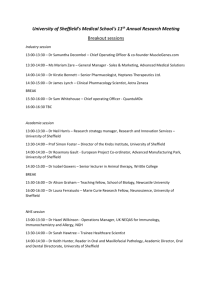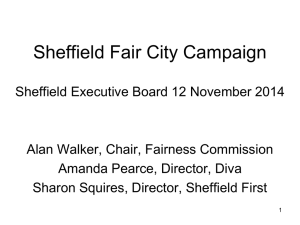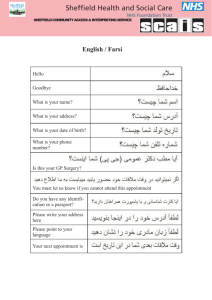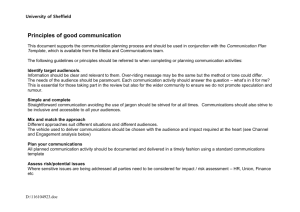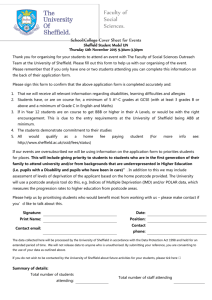VCESIM - LTE Dynamic System Simulator
advertisement
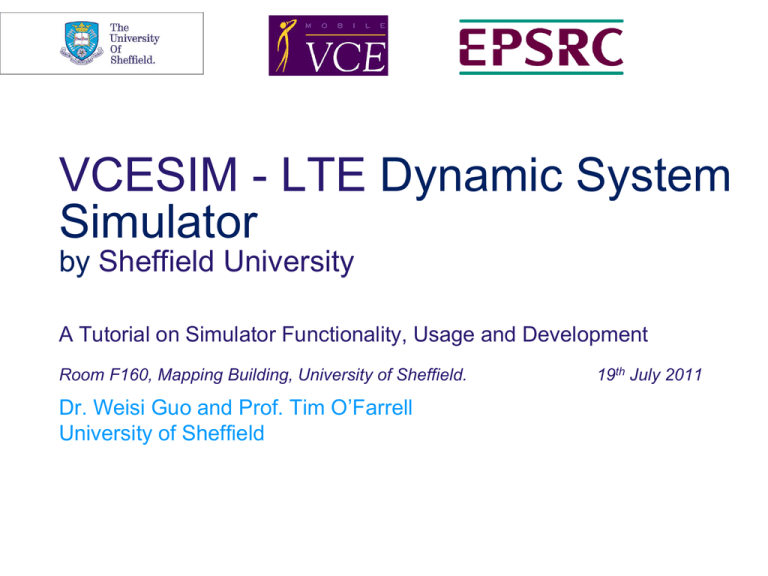
VCESIM - LTE Dynamic System Simulator by Sheffield University A Tutorial on Simulator Functionality, Usage and Development Room F160, Mapping Building, University of Sheffield. Dr. Weisi Guo and Prof. Tim O’Farrell University of Sheffield 19th July 2011 2 Contents • Introduction • Development Time Line • Functionality Overview and Details • Usage • Results • Development and Version Control 27/06/2013 © The University of Sheffield Part 1: Introducing the Simulator 4 Introduction • Written by Dr. Weisi Guo • Approved by Prof. Tim O’Farrell • Asset of MVCE and University of Sheffield • For use by Industrials • Current Version 1.6 • Development duration: Dec 2010 to July 2011 27/06/2013 © The University of Sheffield 5 Time Line 19th July: Tutorial on Code Functionality and Usage. Feedback on Development. Jan: TSG Feedback on Cell Deployment, Antenna Patterns and Initial Results v0.0 Started Development Dec v1.2 Antenna Patterns and Sectorization Jan v1.1 Basic Deployment: Cell Size Feb v1.4 Power Control and Traffic Models Mar v1.3 HSPA & Sleep Mode & Energy Models 27/06/2013 © The University of Sheffield Apr v1.6 Mobility Model and Uplink May v1.5 Cell Expansion: Flex-RAN Jun v1.8 Advanced Scheduling Jul v1.7 Het-Nets: Overlay and Generic Aug Sep v1.9 Integrating Solutions 6 Validation • Validated against 3GPP Ericsson Downlink [1] 3 Sectors with Frequency Re-use Pattern with 1x2 SIMO, ISD = 1700m VCE SIM Throughput: 1.3 bit/s/Hz/cell Average Literature Throughput: 1.2/bit/s/Hz/cell 3 Sectors with Frequency Re-use Pattern 1 with 2x2 SUMIMO, ISD = 1700m VCE SIM Throughput: 1.6 bit/s/Hz/cell 3GPP Ericsson Throughput: 1.6 bit/s/Hz/cell [1] LTE Performance Evaluation – Uplink Summary 3GPP TSG RAN R1-072261, November 2007 27/06/2013 © The University of Sheffield 7 Design Philosophy • Create First, Improve Later • Easily Customizable • Integrate other Research Solutions • Reveal fundamental metrics & mechanisms • At the cost of: slower simulation times 27/06/2013 © The University of Sheffield 8 Storage and Referencing • Stored on NEC Secure Server • Request permission from Author, Approver & MVCE • Internal Reference: TR-GR-0076 • External Reference: Green Cellular Network, IEEE Wireless Advanced Conference 27/06/2013 © The University of Sheffield 9 Functionality Overview • User Distribution, Traffic and Mobility • Cell Deployment and Transmission • Channel Propagation Modelling • Attachment and Scheduling • Downlink and Uplink Throughput • Results Extraction 27/06/2013 © The University of Sheffield 10 Input Parameters 2500 2000 1500 1000 500 0 -500 Distribute Users & Cells -1000 -1500 -2000 -2500 -3000 -2000 -1000 0 1000 2000 3000 Optimization Loop: Cell Size, Antenna Parameters, Resource Allocation 2500 2000 1500 1000 500 0 -500 -1000 -1500 Attach Users to Cells -2000 -2500 -3000 -2000 -1000 0 1000 2000 3000 Schedule Users Downlink, Uplink & Other Results 27/06/2013 © The University of Sheffield 11 Input Parameter List 1 27/06/2013 © The University of Sheffield 12 Input Parameter List 2 27/06/2013 © The University of Sheffield 13 Functionality Customization • Each function’s ability is toggled by a logical input, i.e., 1 = Sleep Mode, 0 = No Sleep Mode • To add extra functionality, add an extra logical step inside the function • Update the user manual accordingly 27/06/2013 © The University of Sheffield 14 Key Functions 27/06/2013 © The University of Sheffield Part 2: Detailed Simulator Functionality 16 User Distribution • 2 User Distribution Choices: Fixed or Random • Parameters: Simulation Area and Density (per km2) 2500 2500 2000 2000 1500 1500 1000 1000 500 500 0 0 -500 -500 -1000 -1000 -1500 -1500 -2000 -2000 -2500 -3000 -2000 -1000 0 27/06/2013 © The University of Sheffield 1000 2000 3000 -2500 -3000 -2000 -1000 0 1000 2000 3000 17 Traffic Load • Related to Number of Users and QoS demanded • 2 Choices: Full Load or Partial Load Dense Urban Peak: 120Mbit/s/km2 Dense Urban Mean: 80Mbit/s/km2 Dense Urban Low: 30Mbit/s/km2 27/06/2013 © The University of Sheffield 18 User Mobility • 2 Choices: Manhattan or Browning • Parameters: Restriction Factor and Speed • Future: Mixture of Users 2500 2500 2000 2000 1500 1500 1000 1000 500 500 0 0 -500 -500 -1000 -1000 -1500 -1500 -2000 -2000 -2500 -3000 -2000 -1000 0 1000 27/06/2013 © The University of Sheffield 2000 3000 -2500 -3000 -2000 -1000 0 1000 2000 3000 19 Homogeneous Cell Deployment • Parameters: Inter-cell-site distance, Horizontal Sectors, Vertical Sector-Sets, Frequency Reuse Pattern • Optional Parameters: Inter-cell and Intra-cell Rotation 27/06/2013 © The University of Sheffield 20 Heterogeneous Cell Deployment • Parameters: Inter-cell-site distance, Horizontal Sectors, Vertical Sector-Sets, Frequency Reuse Pattern • Optional Parameters: Inter-cell and Intra-cell Rotation 27/06/2013 © The University of Sheffield 21 Transmission Power • Max. Transmission Power varies with inter-site distance. • Sleep Mode Power consumption can vary as a percentage of the overhead power. 27/06/2013 © The University of Sheffield 22 Antenna Pattern • Depends on Cell Type and Plane • Horizontal Plane: Theoretical Expression • Vertical Plane: Look Up Table in Book of Assumptions. • Only 2D Antenna Patterns so far, but can modify to get a 3D version in. 27/06/2013 © The University of Sheffield 23 Pathloss Model • Options: WINNER II Urban Micro/Macro, COST 231 HATA/Walfish-Ikegami, Freespace. • Multipath and Shadow Fading on sub-carrier level. Multipath Options: WINNER II model or Independent Rayleigh. 27/06/2013 © The University of Sheffield 24 Cell Selection • Select Cell Based on Strongest Downlink SINR • Central Cell-Site Users are considered for performance • Outer Cell-Site Users are considered for interference 2500 2000 Planned Work: Wrap Around and Soft Handover Functionality 1500 1000 500 0 -500 -1000 -1500 -2000 -2500 -3000 -2000 -1000 0 27/06/2013 © The University of Sheffield 1000 2000 3000 25 Scheduling • Conventional Scheduler: Round Robin with option of using all resource blocks or be QoS dependent. • Proportional Fairness and Max SINR (version 1.8, August) • Green Scheduler: Energy Efficient Proportional Fair Scheduler (version 1.8 of code, August), incorporating Charles’ work. 27/06/2013 © The University of Sheffield 26 UL and DL Throughput • Options: Shannon Capacity, Backed-off Shannon, Adaptive Modulation and Coding (AMC) Table. AMC from BoA-Bristol or Vienna LTE Link Simulator. • Downlink SINR: Interference from other cells to user • Uplink SINR: Interference from other users to serving cell 6 Gaussian (Shannon) Gaussian (LTE Backoff) MCS Lookup Table Capacity, bits/s/Hz 5 SINR RShannon LTE min BW log 2 (1 ), Backoff 4 Shannon 64 QAM MAX RShannon LTE 3 16 QAM 2 Clearly, the Shannon bound is a poor approximation 1 QPSK 0 -10 -5 0 5 10 15 20 SINR, dB 27/06/2013 © The University of Sheffield 25 30 35 40 27 Results Extraction • Total/Average UL/DL Rate, • 95% UE achieved UL/DL Rate, • Outage Probability, • ECR, • Sleeping Cells. • Average UL/DL SINR. 27/06/2013 © The University of Sheffield 28 2D Plotting • Capabilities: Track Moving UE, Show Cell Selection 2500 2500 2000 2000 1500 1500 1000 1000 500 500 0 0 -500 -500 -1000 -1000 -1500 -1500 -2000 -2000 -2500 -3000 -2000 -1000 0 27/06/2013 © The University of Sheffield 1000 2000 3000 -2500 -3000 -2000 -1000 0 1000 2000 3000 29 3D Plotting • Capabilities: Show Average DL Received SINR 27/06/2013 © The University of Sheffield Part 3: Demonstration 31 Requirements • Authorized Access to NEC Server • Permission from Dr. Weisi Guo, Prof. Tim O’Farrell and Simon Fletcher • Matlab installed, prefer 2010b edition or better • Technical Support: contact Dr. Weisi Guo • Joint code development, is not available yet. 27/06/2013 © The University of Sheffield 32 Starting Point • Access NEC Server • Select Trunk and Copy Files into same Matlab Folder 27/06/2013 © The University of Sheffield 33 Running Simulator • Access Matlab • Version developed on 7.10.0 R2010a • Select Correct Folder pathway • Open the Main LTE Simulator File: LTE Simulator v1.6.m 27/06/2013 © The University of Sheffield 34 Inputs and RUN • Should look like this: • Version Control at top • Parameters and input advice given next • Just click run, and the Matlab window will regularly tell you what’s happening. 27/06/2013 © The University of Sheffield Part 4: Development and Feedback 36 Making Changes • Making changes requires using SVN (software version control) • Committing changes is simple. 27/06/2013 © The University of Sheffield 37 Going Forward 19th July: Tutorial on Code Functionality and Usage. Feedback on Development. V1.6 Mobility Model and Uplink Jun Nov: Feedback on Integration Progress and Simulator Update v1.8 Advanced Scheduling Jul v1.7 Het-Nets: Overlay and Generic Aug Sep V1.9 Wrap Around and Indoor Simulator 27/06/2013 © The University of Sheffield V2.2 Soft Handovers Oct Nov v1.11 Integrating MVCE Solutions Dec Jan V2.1 Legacy Systems Feb Mar V2.3 ?? 38 Outdoor: Multi-Cell, Multi-User Network 2500 2500 2000 2000 1500 1500 1000 1000 500 500 0 0 -500 -500 -1000 -1000 -1500 -1500 -2000 -2000 -2500 -3000 -2000 -1000 0 1000 2000 3000 -2500 -3000 -2000 -1000 0 1000 2000 3000 User Mobility, Offered Load Density, Cell Sectorization and Frequency Reuse Patterns 2500 6 Gaussian (Shannon) Gaussian (LTE Backoff) MCS Lookup Table 2000 5 1500 Capacity, bits/s/Hz 1000 500 0 -500 -1000 4 3 2 -1500 1 -2000 -2500 -3000 -2000 -1000 0 1000 2000 3000 0 -10 -5 0 5 10 15 20 SINR, dB 25 30 35 40 Adaptive Modulation & Coding, Sleep Mode Operation and Relays 27/06/2013 © The University of Sheffield 39 Indoor: Customizable Architecture Large Office Corridors Washroom Outdoor Interference Small Office Femto-cells 27/06/2013 © The University of Sheffield 40 Integrated Simulator Base-stations Relays 27/06/2013 © The University of Sheffield Indoor Femto-cells


